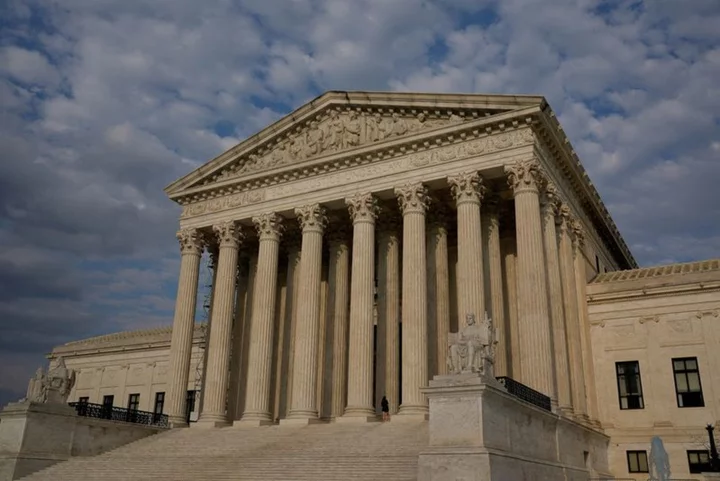By Andrew Chung
(Reuters) -The U.S. Supreme Court on Thursday upheld decades-old federal requirements that give preferences to Native Americans and tribal members in the adoption or foster care placements of Native American children, rejecting a challenge claiming parts of the law were racially biased against non-Native Americans.
The 7-2 ruling threw out a lower court's decision that had struck down a federal standard giving preference for adoptive placements, after extended family or tribal members, to "other Indian families," as a violation of the U.S. Constitution's Fifth Amendment guarantee of equal protection under the law.
The justices found that the plaintiffs - the Republican-governed state of Texas and three non-Native American families - lacked the necessary legal standing to bring their challenge. They also rejected challenges to the law, known as the Indian Child Welfare Act of 1978, on other grounds.
The "bottom line," conservative Justice Amy Coney Barrett wrote in the ruling, "is that we reject all of petitioners' challenges to the statute, some on the merits and others for lack of standing." Two conservative justices, Clarence Thomas and Samuel Alito, dissented from the decision.
The Indian Child Welfare Act sought to reinforce tribal connections by setting federal standards for removal and placement in foster care or adoption.
Congress passed it to end a longstanding practice in the United States of removing many Native American children from their families and placing them with non-Native Americans. At the time of the law's passage, between 25% and 35% of all Native American children were removed in states with large Native American populations, according to court papers.
The law set federal standards for removing children from their families and placing them for foster care or adoption, including requiring that "preference" be given to members of a child's extended family, other tribe members or "other Indian families."
President Joe Biden, whose administration defended the law in the case, said the decision keeps in place a vital protection for tribal sovereignty and Native American children.
"The touchstone law respects tribal sovereignty and protects Native children by helping Native families stay together and, whenever possible, keeping children with their extended families or community who already know them, love them and can help them understand who they are as Native people and citizens of their Tribal Nations," Biden said in a statement.
'OVERCOME WITH JOY'
Native American groups cheered the court's decision.
"We are overcome with joy," a coalition of organizations including the Indian Child Welfare Association and the National Congress of American Indians said in a statement.
"One thing is certain: ICWA (Indian Child Welfare Act) is crucial for the safety and well-being of Native children and families and the future of Native peoples and Tribal Nations. The positive impact of (Thursday's) decision will be felt across generations," the coalition said.
The lawsuit, first filed in 2017, was brought against the U.S. Interior Department and federal officials by Texas and the three families who sought to adopt or foster Native American children. They include Texas couple Jennifer and Chad Brackeen, who in 2018 adopted a child whose mother is a member of the Navajo Nation.
Among other claims, the plaintiffs said the statute racially discriminates against non-Native Americans, violating the Constitution's Fifth Amendment guarantee of equal protection under the law, and that it unconstitutionally directs the actions of state agencies in adoption matters.
A federal judge ruled favor of the challengers on both claims in 2018. In 2021, the New Orleans-based 5th U.S. Circuit Court of Appeals narrowed the judge's ruling, but affirmed the invalidation of certain parts of the law.
Barrett said the court could not decide the merits of the race claims made by the plaintiffs. Suing the federal government would not remedy the racial discrimination alleged by the families "because state courts apply the placement preferences, and state agencies carry out the court-ordered placements," she wrote.
Texas, Barrett added, also lacked standing because the state as an entity has "no equal protection rights of its own," as individuals do.
During arguments in the case in November, conservative Justice Brett Kavanaugh said it would not be permissible for Congress to give white parents preferences for adopting white children or Latino parents preferences for Latino children.
Kavanaugh, in a concurring opinion on Thursday, emphasized that the "serious" racial discrimination claims made in the litigation remain undecided.
"Courts, including ultimately this court, will be able to address the equal protection issue when it is properly raised by a plaintiff with standing - for example, by a prospective foster or adoptive parent or child in a case arising out of a state-court foster care or adoption proceeding," Kavanaugh wrote.
The ruling also rejected claims by the plaintiffs that Congress lacked the authority to enact the law at issue.
(Reporting by Andrew Chung in New York; Editing by Will Dunham)

